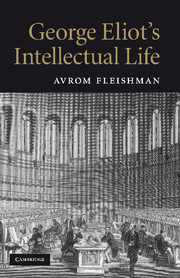Book contents
- Frontmatter
- Contents
- Acknowledgements
- Preface
- Introduction
- 1 The “Evangelical”: starting out in a Christian culture
- 2 The Apostate: moving beyond the Christian mythos
- 3 The Journalist: editing, reviewing, shaping a worldview
- 4 The Germanist: balancing the counterweight of German thinkers
- 5 The Novelist: mixing realism, naturalism and mythmaking
- 6 The Historian: tracking ideals – utopian and national – in Romola and The Spanish Gypsy
- 7 The “Radical”: taking an anti-political stance in Felix Holt
- 8 The Encyclopedist: transcending the past in Middlemarch
- 9 The Visionary: transmitting ideals in Daniel Deronda
- 10 The Intellectual: cultural critique in Impressions of Theophrastus Such
- Notes
- Works cited
- Name index
3 - The Journalist: editing, reviewing, shaping a worldview
Published online by Cambridge University Press: 05 April 2010
- Frontmatter
- Contents
- Acknowledgements
- Preface
- Introduction
- 1 The “Evangelical”: starting out in a Christian culture
- 2 The Apostate: moving beyond the Christian mythos
- 3 The Journalist: editing, reviewing, shaping a worldview
- 4 The Germanist: balancing the counterweight of German thinkers
- 5 The Novelist: mixing realism, naturalism and mythmaking
- 6 The Historian: tracking ideals – utopian and national – in Romola and The Spanish Gypsy
- 7 The “Radical”: taking an anti-political stance in Felix Holt
- 8 The Encyclopedist: transcending the past in Middlemarch
- 9 The Visionary: transmitting ideals in Daniel Deronda
- 10 The Intellectual: cultural critique in Impressions of Theophrastus Such
- Notes
- Works cited
- Name index
Summary
In October 1850, two visitors to the Brays, where George Eliot was temporarily staying, made a number of overtures to her that were to prove transformative. They were a young publisher, John Chapman, and a scholarly gentleman, Robert W. Mackay. Chapman had recently published Mackay's book, The Progress of the Intellect, which purported to trace civilization's advance beyond early religion, and which was reputed to follow Strauss's mythical approach to the Bible. “It was natural that Chapman should ask the Translator of Strauss to write an article on the book, which the editor of the Westminster Review had agreed to publish. [Eliot] was only too glad of the opportunity.” The assignment was not only an entry into the world of publishing at a high level, but also the occasion of a literal move to the center of London's intellectual milieu. Chapman's office-cum-home-cum-boarding house at 142 Strand (the Strand being a continuation of Fleet Street) was also to prove a scene of sexual fiddle-faddle involving her (if only tangentially) with Chapman, his wife and his mistress, as well as of high intellectual pursuits, but it has become, or should become, a shrine for believers in the “progress of the intellect.”
Eliot's review (shortly to be discussed) was to be placed in the Westminster Review, in which Chapman had more than a book publisher's interest.
- Type
- Chapter
- Information
- George Eliot's Intellectual Life , pp. 44 - 71Publisher: Cambridge University PressPrint publication year: 2010



